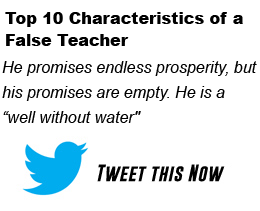Because of our human tendency to emphasize some truths in scripture and to neglect others, we are all prone to heresy from time to time. This is one of the many reasons we need other members of the body of Christ to speak into our lives and give balance. But how can we distinguish between someone who simply needs their doctrine tweaked and an actual false teacher? Simply defined, a false teacher is an individual who has influence over others and exalts his own knowledge and authority over God’s without regard for how others will be affected. A false teacher has a philosophy and makes statements that are in direct contradiction to what the Bible teaches. Because much of what they pass off as absolute truth is contrary to sound doctrine (as revealed in scripture), the false teacher leaves behind a wake of division and strife (Romans 16:17). To help identify this charlatan in a modern context I have listed 10 characteristics of the false teacher.
Top 10 Characteristics of a False Teacher – How to Recognize a Wolf in Sheep’s Clothing
[Please note, my traditional use of masculine pronouns is intended to represent both genders.]
1. He is a minister of unbelief
He will delight in the shortcomings and misgivings of those who seek to minister the Gospel; instead of encouraging critical thinking and proper exegesis, he will rally his followers in disbelief, deceiving the minds of naïve listeners. He will create his own way, his own form of godliness. He follows the way Cain which is to deny the evidence of God’s revelation and act on his own, apart from faith. He cannot please God because his actions are apart from God’s revealed word (Hebrews 11). He conspires against the authority of God and His law by following after Korah’s rebellion (Number 16), and accordingly lines himself up with other discontented and mutinous men. It is the classic “every one and every way is holy before God” that makes up part of his error. He challenges the very order and authority of God, and like Korah, drags down with him as many errant and unsuspecting souls as he can.
2. His focus is on an earthly kingdom
John the Baptist’s message to “repent for the kingdom of God is at hand” is so contradictory to the false teacher, that he profanes it by using every opportunity and resource available to debase and devalue the power it holds. He may speak some form of truth, but he alters it enough to drive the current of his listeners in the direction of the world. He speculates with others’ gifts, talents and abilities, promising great returns; but the kingdom he is purportedly building is really just a small contribution to the god of this world (2 Corinthians 4:4). His counsel will yield nothing but grief.
3. He is an opportunist
He will pursue progress over principle and exploit forms of truth for personal gain and interest. He is an authority in greed. Balaam is a classic example (Number 22-24). He was the prophet hired by Balak, king of the Moabites in order to further his efforts to discourage and ultimately defeat Israel. John 10:12 warns us against the hireling who cares nothing for the sheep. God won’t let Balaam curse Israel so instead Balaam offers the ultimate solution to the king that is sure to cut off Israel’s blessing. Balaam’s counsel was to mix the teachings of Moses with other teachings, to infuse the Moabites customs, feasts and philosophies into a destructive compromise that would ultimately lead to judgment.
4. He makes grandiose promises he cannot fulfill
He is crafty, deceitful and full of fraud (Acts 13:10, Ephesians 4:14). He promotes personal rights in exchange for God’s righteousness. The mantra of his most affected disciples is “my rights!” – My thoughts, my body, my decision, my feelings. He promises endless prosperity, but his promises are empty. He is a “well without water, clouds carried by a tempest, for whom is reserved the blackness of darkness forever.” (2 Peter 2:17). In following the trajectory of his course you will soon see it is bent toward destruction (2 Peter 2:1).
5. He fabricates his own message
He will deny Christ and pave his own way with religions, philosophies and pet doctrines. He may speak of Christ and profess to know God “…but in works [he will] deny Him, being abominable, and disobedient, and unto every good work reprobate” (Titus 1:16). His religion is self-made and a collaboration of teachings that suit his own desires (2 Timothy 4:3). He will, in essence, reject the Messiah to create his own savior. He is not ignorant of who God is, but he turns his back on God. Even so, he hates, is even jealous of those who truly do know, serve and worship the Messiah, as Cain was jealous of Abel. His way is “a way that seems right to a man.” (Proverbs 14:12).
6. He will purposefully and skillfully twist scripture
It is not merely the general misapplication of biblical exegesis to justify sin and promote pet doctrines; no, I speak of a far more sinister person. He holds little regard for truth and only uses it to underhandedly craft lies, then leads others down the same road to destruction because of it. He bears false witness against God, denying the truth and speaking perverse things. (Acts 20:28-30). He will push agenda, redefine even the most fundamental truths, and make up stories that appeal to the human nature (II Peter 1: 16; 2:3).
7. He will tolerate sin and deny the order of God’s design
He has given in to the witchcraft of Jezebel, independent and unyielding. Yes, this sprit is most attracted to the female host, but it is also pervasive among male authorities and is prevalent in religious leadership. His way, as Jezebel’s, leads to forsaking the covenant and engaging in idolatry. His lust is for power so that repentance is far from his mind. He is isolated from both real fellowship and meaningful accountability. He is a master manipulator who does not need to use physical aggression to take down and destroy. He is like Balaam who betrayed the people of God by revealing to Israel’s enemies the Achilles heel of God’s people, advising the enemy to mix the worship of God with idols to seduce them away. He will urge tolerance over holiness.
8. His prayers are self-centered
In point two, I included the false teacher’s characteristic of building a kingdom on earth rather than building toward the eternal kingdom; his prayer will reflect this element. Rather than “Thy kingdom come, Thy will be done”, he subtly proclaims, “my kingdom come and my will be done”. His prayer is as vague as the many paths he promotes and they are not in agreement with the revealed word of God. In denying the sinful nature of mankind, his approach to God is profane.
9. He seeks to throw people into confusion and discouragement
He promotes confusion (Galatians 5:10). He “has an unhealthy interest in controversies and quarrels about words that result in envy, strife, malicious talk, evil suspicions. (1Timothy 6:4). He reports falsely about spiritual leaders for the purpose of discrediting their message. Defamation of character with malicious intent is his goal because in order to propagate his own lies, he must first discredit the truth and those who champion it.
10. He will compromise the truth
His will appeal to human nature and provide direction toward compromise. The Nicolaitans are a biblical example of this characteristic of false teaching. There is strong support by many biblical scholars that the Nicolaitans descended from Nicolas of Antioch who was chosen as one of the first deacons of the church (Acts 6:5). He was a Gentile, who had been entrenched in paganism but converted to Judaism, then to Christianity. It seems, according early church writings, that he sought to justify the doctrines contained in all three religions. God hated the deeds of the Nicolaitans (Revelations 2:6) and he hates compromise (Revelation 3:15-16).
Conclusion
Discipline yourself in the study of the God’s word so that you will be able to guard against false prophets: “Don’t let anyone deceive you in any way, for that day will not come until the rebellion occurs and the man of lawlessness is revealed, the man doomed to destruction.” (2 Thessalonians 2:3).

